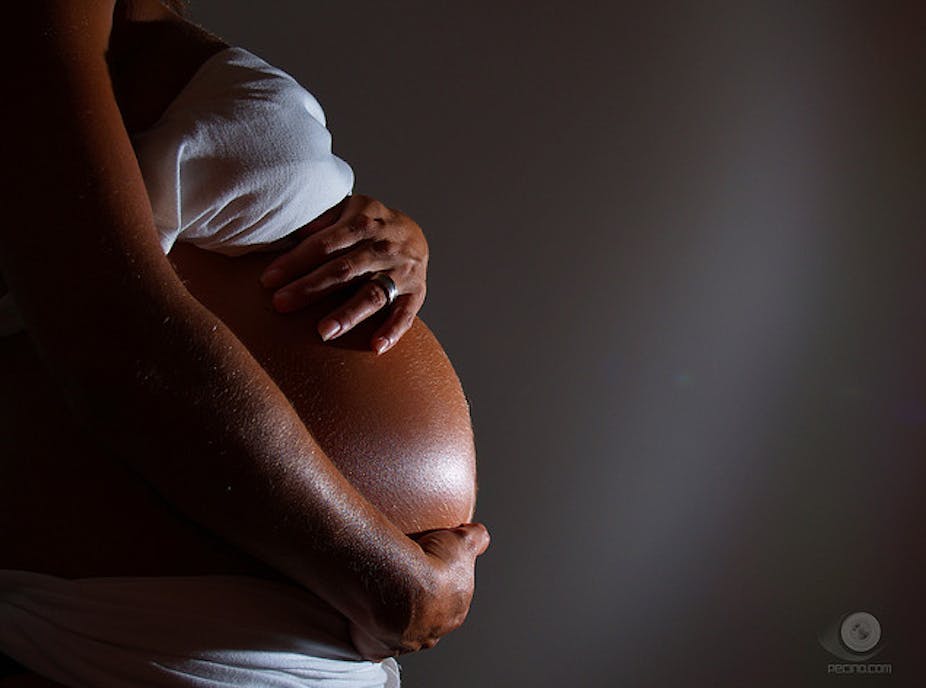If we want to understand child development, we need to start before birth. We have known for decades that health depends on an interaction between our genes and our environment. But we’ve also come to realise that a key part of that environment is in the womb before we’re born.
There is now considerable evidence that the mother’s emotional state during pregnancy can affect the development of her baby’s brain.
This is because of “foetal programming”, where a changing environment in the womb through different sensitive periods can alter the development of the foetus. This then goes on to affect the child in the longer term and into adulthood.
This is clearly important in physical health; if a baby grows less well than it should in the womb, he or she will be at greater risk of coronary heart disease or diabetes in later life. But there is now considerable evidence that foetal programming is also important for neurodevelopment in the brain.
Prenatal stress has been associated with the risk of a wide range of outcomes. These include both neurodevelopmental and physical problems, with the likes of anxiety, ADHD and lower cognitive development on one hand and diseases such as asthma on the other.
What kind of stress?
“Stress” is a generic term, which includes a number of different types of exposure. Many exposures, varying from mild to very severe, have been shown to affect outcomes for the child. They can include symptoms of maternal anxiety and depression, pregnancy specific anxiety, daily hassles, bereavement, life events, bad relationships and exposure to acute disasters.
Our research showed that a child’s risk of developing emotional or behavioural problems doubles from 6% to 12% if its mother is stressed, anxious or depressed. Although this means that most children will not be affected, this increased risk is of clinical significance.
One important question is whether or not these associations between prenatal stress and altered outcomes are causal, ie directly linked, or whether the associations are due to other factors. For example, mothers who are anxious, depressed or stressed prenatally can continue to suffer these issues after the baby is born. This can also affect their parenting. Factors such as smoking, drinking alcohol and hereditary genetic defects may also play a role.
There are various ways of addressing the question of causality. Studies using animals have been conducted, where offspring were cross-fostered to eliminate parenting problems as a cause. This model also showed that prenatal stress causes behavioural alterations in offspring.
Imperial College’s Fetal and Neonatal Stress Research Group have conducted large population studies using the Avon Longitudinal Study of Parents and Children (ALSPAC) cohort from Bristol. Our research accounted for a wide range of external factors which could influence the findings, including the father’s mood, to control for genetics. The associations with child emotional and behavioural outcomes remain strong, providing good evidence for a causal link.
How stress reaches the womb
Our group wants to discover the underlying mechanism that causes this association. One possibility is that the foetus is exposed to increased amounts of the stress hormone, cortisol.
This has been shown in animal studies. And our research found that exposure to raised cortisol levels in the amniotic fluid is associated with lower cognitive function in the child later on.
We also recently proved that the function of the placenta changes in association with maternal anxiety. Essentially, we noticed a decrease in the enzyme that breaks down cortisol, potentially allowing more cortisol to pass through the placenta and affect the baby’s development.
We’re only just starting to understand these possible mechanisms. Many other systems are likely to be involved, for example the role of serotonin, a neurotransmitter that transmits signals in the brain and which is known to affect foetal neurodevelopment.
Most anxiety, depression and emotional and physical abuse experienced by pregnant women remains undetected by health professionals. Even when the symptoms are recognised, it can be difficult to get help. To counter the harmful effects that stress has on a developing baby, we need to be more aware and provide more emotional support.

